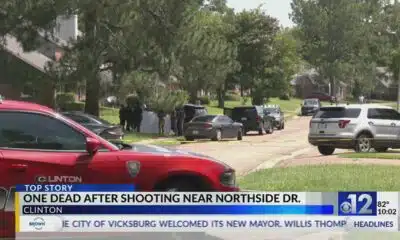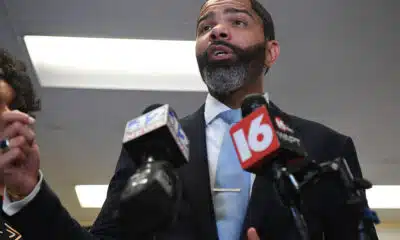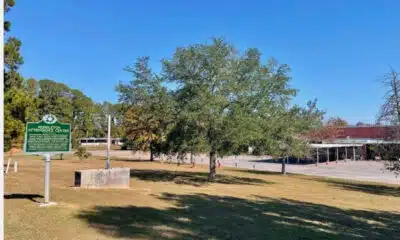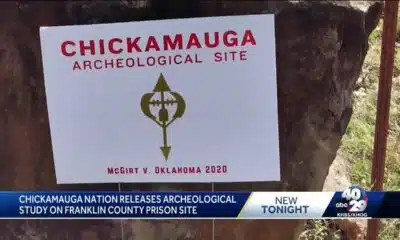Mississippi Today
National monument will honor Emmett Till and his mother in Mississippi and Chicago
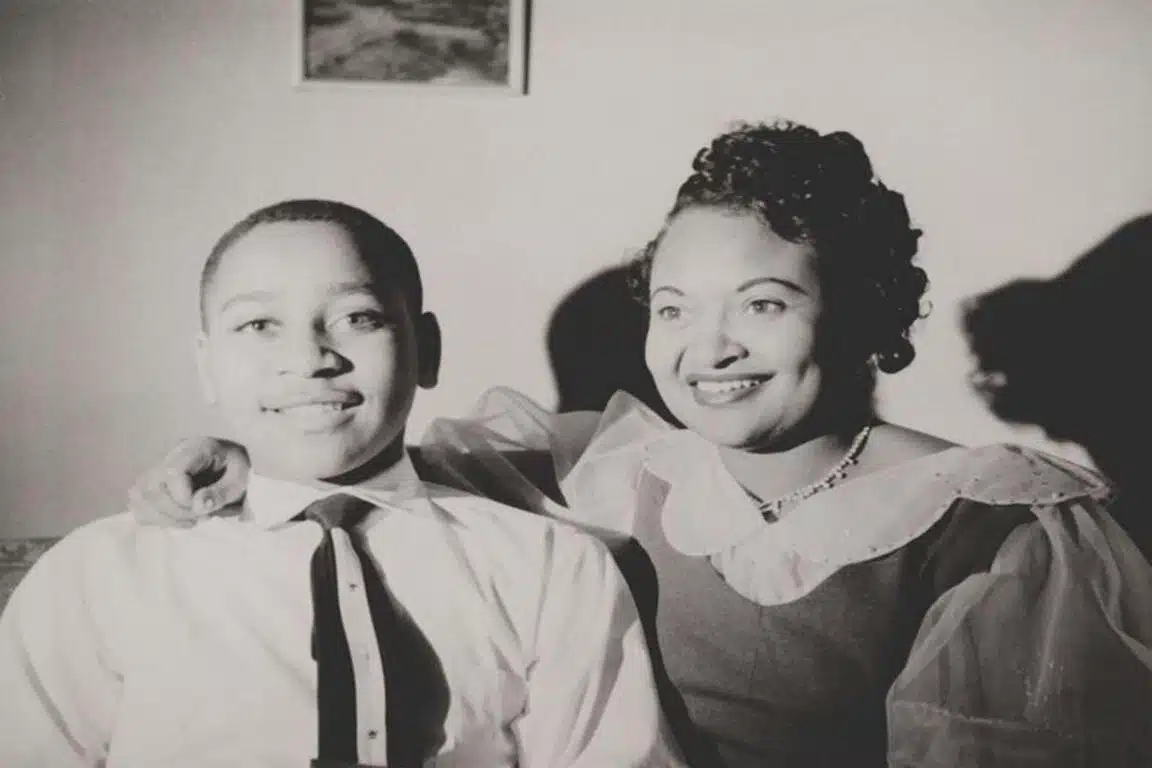
President Joe Biden is expected to sign documents Tuesday to create a national monument honoring Emmett Till and his mother, according to National Park Service officials.
“The Till story is a vital part of the American story, and it’s fitting that it’s recognized and protected by the federal government,” said Dave Tell, author of “Remembering Emmett Till.”
After he was killed in Mississippi, his mother, Mamie Till-Mobley, insisted on opening his casket so “the world could see what they did to my boy.” Photographs of his brutalized body ran in Jet magazine and around the world, provoking international outrage.
In September 1955, an all-white jury acquitted half-brothers Roy Bryant and J.W. Milam — only for them to confess months later to Look magazine that they had killed the 14-year-old from Chicago.
Less than 10 weeks after the acquittal, Rosa Parks boarded a bus in Montgomery, Alabama, and refused to give up her seat. She was quoted later as saying she was thinking about Till the whole time.
To this day, he remains a flashpoint for civil rights activities. The Rev. Martin Luther King Jr. mentioned his name in the same breath with the 1963 assassination of his friend, Mississippi NAACP leader Medgar Evers.
In the decades since, Till’s name and photographs have appeared in protests alongside those of Trayvon Martin, Ahmaud Arbery and George Floyd.
Among the sites making up the Emmett Till and Mamie Till-Mobley National Monument:
- Roberts Temple Church of God in Christ in Chicago where Till’s funeral was held.
- Graball Landing, near where Till’s body was found in the Tallahatchie River.
- The Tallahatchie County Courthouse in Sumner, where the jury acquitted his killers.
Noticeably missing from the list is the former Bryant Grocery, where Till reportedly wolf-whistled at a white woman.
The store’s owners — the children of the late Ray Tribble, who voted with other jurors to acquit Till’s killers — have repeatedly refused to sell the store, demanding $4 million for the crumbling structure. That price tag prompted the late Alvin Sykes, the force behind the Emmett Till Unsolved Civil Rights Crimes Act, to remark that the family was “holding history hostage.”
The Rev. Wheeler Parker Jr., the last living witness of Emmett Till’s kidnapping, said it’s been his life’s work “to tell the truth of what happened to Emmett.”
“This national monument designation makes certain that Emmett Till’s life and legacy, along with his mother Mamie Till-Mobley’s social action and impact, will live on and be used to inspire others to create a more just and equitable society,” Parker said. “We thank President Biden for codifying the national monument and are heartened to know these places will foster empathy, understanding and healing for years to come.”
Veteran state Rep. Tommy Reynolds, D-Water Valley, says the action of President Joe Biden to designate the national monument to honor Emmett Till is the culmination of hard work by local people.
“We had people in Tallahatchie County work together to form the Emmett Till Commission. It was half white and half Black. A lot of people worked to preserve the sites and deserve credit. They worked together,” said Reynolds, who represents much of the area in the Mississippi House and is the attorney for the Tallahatchie County Board of Supervisors. He will be present at the Tuesday ceremonies at the White House and at the Department of Interior.
“This is going to be well received in our area. And it is appropriate to be remembered in hopes it will not happen again. We are all Americans and should have the right to life, liberty and happiness.”
Reynolds said the federal, state and local governments contributed to restoring the Tallahatchie County Courthouse in Sumner to its 1955 condition. In 1955 two white men were tried and acquitted by an all white jury for the murder of the teen-ager Till. The men later confessed to the murder.
The Mississippi Legislature passed a bill to allow Tallahatchie County to convey the deed to the courthouse to the federal government.
Money also has been raised to provide a new location to replace the historic Tallahatchie County Courthouse where routine business can be conducted. Under the agreement, the historic courthouse can still be used by the county until the new location is ready.
The center’s executive director, Patrick Weems, said the designation represents 15 years of hard work for a story that is pivotal in our nation’s history.
“The lynching of Emmett Till and the courage of Mamie Till Mobley served as a springboard to the modern Civil Rights Movement, and preserving this history in perpetuity will serve as a continual act of restorative justice,” Weems said. “We extend our deepest gratitude to the Tallahatchie County Board of Supervisors, and Congressman Bennie Thompson for championing this vision of reconciliation, which has now become a national monument.”
Rev. Willie Williams, chair of the board of directors of the Emmett Till Interpretive Center, praised the decision to designate a national monument.
“Out of the tragedy of Emmett Till’s brutal murder, a national monument has risen as a symbol of hope, healing, and reconciliation,” he said. “Through this designation, we affirm that what man intended for evil, God can indeed use for good. We honor the memory of Emmett Till and his mother, Mamie Till-Mobley, whose courageous actions sparked a civil rights movement and continue to inspire us today. We are grateful to the local people of Tallahatchie County who have tirelessly worked to make this monument a reality. Their efforts remind us that out of the ashes of tragedy, beauty can emerge, and that through collective action, we can transform pain into progress.”
The National Trust for Historic Preservation’s African American Cultural Heritage Action Fund and the Mellon Foundation are investing $5 million to help preserve the Roberts Temple Church of God in Christ for future generations.
Theresa Pierno, president and CEO of National Parks Conservation Association, said throughout our nation’s history, “There are few stories as heart wrenching as the murder of Emmett Till. It is a story that lays bare the brutality of systemic racism and injustice for the world to see.
“But it is also a story of determination,” Pierno said. “This is a story of a brave young mother who experienced a parent’s worst nightmare, but found the strength and power to rise up and shine a light on injustice as a leader in the Civil Rights Movement. Mamie Till-Mobley galvanized a movement and inspired a nation.
“Yet despite the progress we have made since 1955, the work is not done. The America we live in still bears many of the scars of the past, and some of our darkest history repeats itself. We still see echoes of Emmett’s story and blatant racial injustice in our society today, and as national park advocates, we are committed to doing our part to fight it. Black Lives Matter. They matter in our homes, they matter in our stores, our cities, and yes, in our national parks.”
Mississippi Today political reporter Bobby Harrison contributed to this report.
This article first appeared on Mississippi Today and is republished here under a Creative Commons license.
Mississippi Today
Jackson’s performing arts venue Thalia Mara Hall is now open
After more than 10 months closed due to mold, asbestos and issues with the air conditioning system, Thalia Mara Hall has officially reopened.
Outgoing Mayor Chokwe A. Lumumba announced the reopening of Thalia Mara Hall during his final press conference held Monday on the arts venue’s steps.
“Today marks what we view as a full circle moment, rejoicing in the iconic space where community has come together for decades in the city of Jackson,” Lumumba said. “Thalia Mara has always been more than a venue. It has been a gathering place for people in the city of Jackson. From its first class ballet performances to gospel concerts, Thalia Mara Hall has been the backdrop for our city’s rich cultural history.”
Thalia Mara Hall closed last August after mold was found in parts of the building. The issues compounded from there, with malfunctioning HVAC systems and asbestos remediation. On June 6, the Mississippi State Fire Marshal’s Office announced that Thalia Mara Hall had finally passed inspection.
“We’re not only excited to have overcome many of the challenges that led to it being shuttered for a period of time,” Lumumba said. “We are hopeful for the future of this auditorium, that it may be able to provide a more up-to-date experience for residents, inviting shows that people are able to see across the world, bringing them here to Jackson. So this is an investment in the future.”
In total, Emad Al-Turk, a city contracted engineer and owner of Al-Turk Planning, estimates that $5 million in city and state funds went into bringing Thalia Mara Hall up to code.
The venue still has work to be completed, including reinstalling the fire curtain. The beam in which the fire curtain will be anchored has asbestos in it, so it will have to be remediated. In addition, a second air-conditioning chiller needs to be installed to properly cool the building. Until it’s installed, which could take months, Thalia Mara Hall will be operating at a lower seating capacity of about 800.
“Primarily because of the heat,” Al-Turk said. “The air conditioning would not be sufficient to actually accommodate the 2,000 people at full capacity, but starting in the fall, that should not be a problem.”
Al-Turk said the calendar is open for the city to begin booking events, though none have been scheduled for July.
“We’re very proud,” he said. “This took a little bit longer than what we anticipated, but we had probably seven or eight different contractors we had to coordinate with and all of them did a superb job to get us where we are today.”
This article first appeared on Mississippi Today and is republished here under a Creative Commons Attribution-NoDerivatives 4.0 International License.
The post Jackson’s performing arts venue Thalia Mara Hall is now open appeared first on mississippitoday.org
Note: The following A.I. based commentary is not part of the original article, reproduced above, but is offered in the hopes that it will promote greater media literacy and critical thinking, by making any potential bias more visible to the reader –Staff Editor.
Political Bias Rating: Centrist
The article presents a straightforward report on the reopening of Thalia Mara Hall in Jackson, focusing on facts and statements from city officials without promoting any ideological viewpoint. The tone is neutral and positive, emphasizing the community and cultural significance of the venue while detailing the challenges overcome during renovations. The coverage centers on public investment and future prospects, without partisan framing or editorializing. While quotes from Mayor Lumumba and a city engineer highlight optimism and civic pride, the article maintains balanced, factual reporting rather than advancing a political agenda.
Mississippi Today
‘Hurdles waiting in the shadows’: Lumumba reflects on challenges and triumphs on final day as Jackson mayor
On his last day as mayor of Jackson, Chokwe Antar Lumumba recounted accomplishments, praised his executive team and said he has no plans to seek office again.
He spoke during a press conference outside of the city’s Thalia Mara Hall, which was recently cleared for reopening after nearly a year of remediation. The briefing, meant to give media members a peek inside the downtown theater, marked one of Lumumba’s final forays as mayor.
Longtime state Sen. John Horhn — who defeated Lumumba in the Democratic primary runoff — will be inaugurated as mayor Tuesday, but Lumumba won’t be present. Not for any contentious reason, the 42-year-old mayor noted, but because he returns to his private law practice Tuesday.
“I’ve got to work now, y’all,” Lumumba said. “I’ve got a job.”
Thalia Mara Hall’s presumptive comeback was a fitting end for Lumumba, who pledged to make Jackson the most radical city in America but instead spent much of his eight years in office parrying one emergency after another. The auditorium was built in 1968 and closed nearly 11 months ago after workers found mold caused by a faulty HVAC system – on top of broken elevators, fire safety concerns and vandalism.
“This job is a fast-pitched sport,” Lumumba said. “There’s an abundance of challenges that have to be addressed, and it seems like the moment that you’ve gotten over one hurdle, there’s another one that is waiting in the shadows.”
Outside the theater Monday, Lumumba reflected on the high points of his leadership instead of the many crises — some seemingly self-inflicted — he faced as mayor.
He presided over the city during the coronavirus pandemic and the rise in crime it brought, but also the one-two punch of the 2021 and 2022 water crises, exacerbated by the city’s mismanagement of its water plants, and the 18-day pause in trash pickup spurred by Lumumba’s contentious negotiations with the city council in 2023.
Then in 2024, Lumumba was indicted alongside other city and county officials in a sweeping federal corruption probe targeting the proposed development of a hotel across from the city’s convention center, a project that has remained stalled in a 20-year saga of failed bids and political consternation.
Slated for trial next year, Lumumba has repeatedly maintained his innocence.
The city’s youngest mayor also brought some victories to Jackson, particularly in his first year in office. In 2017, he ended a furlough of city employees and worked with then-Gov. Phil Bryant to avoid a state takeover of Jackson Public Schools. In 2019, the city successfully sued German engineering firm Siemens and its local contractors for $89 million over botched work installing the city’s water-sewer billing infrastructure.
“I think that that was a pivotal moment to say that this city is going to hold people responsible for the work that they do,” Lumumba said.
Lumumba had more time than any other mayor to usher in the 1% sales tax, which residents approved in 2014 to fund infrastructure improvements.
“We paved 144 streets,” he said. “There are residents that still are waiting on their roads to be repaved. And you don’t really feel it until it’s your street that gets repaved, but that is a significant undertaking.”
And under his administration, crime has fallen dramatically recently, with homicides cut by a third and shootings cut in half in the last year.
Lumumba was first elected in 2017 after defeating Tony Yarber, a business-friendly mayor who faced his own scandals as mayor. A criminal justice attorney, Lumumba said he never planned to seek office until the stunning death of his father, Chokwe Lumumba Sr., eight months into his first term as mayor in 2014.
“I can say without reservation, and unequivocally, we remember where we started. We are in a much better position than we started,” Lumumba said.
Lumumba said he has sat down with Horhn in recent months, answered questions “as extensively as I could,” and promised to remain reachable to the new mayor.
This article first appeared on Mississippi Today and is republished here under a Creative Commons Attribution-NoDerivatives 4.0 International License.
The post 'Hurdles waiting in the shadows': Lumumba reflects on challenges and triumphs on final day as Jackson mayor appeared first on mississippitoday.org
Note: The following A.I. based commentary is not part of the original article, reproduced above, but is offered in the hopes that it will promote greater media literacy and critical thinking, by making any potential bias more visible to the reader –Staff Editor.
Political Bias Rating: Center-Left
The article reports on outgoing Jackson Mayor Chokwe Antar Lumumba’s reflections without overt editorializing but subtly frames his tenure within progressive contexts, emphasizing his self-described goal to make Jackson “the most radical city in America.” The piece highlights his accomplishments alongside challenges, including public crises and a federal indictment, maintaining a factual tone yet noting contentious moments like labor disputes and governance issues. While it avoids partisan rhetoric, the focus on social justice efforts, infrastructure investment, and crime reduction, as well as positive framing of Lumumba’s achievements, aligns with a center-left perspective that values progressive governance and accountability.
Mississippi Today
Feds unfreeze $137 million in Mississippi education money
The federal government is restoring $137 million in education funds to Mississippi schools.
The U.S. Department of Education notified states last week that it would reinstate pandemic relief funds. The decision comes less than three months after the federal government revoked billions nationwide as part of Trump administration efforts to cut government spending.
State education agencies and school districts originally had until March 2026 to spend the money, but the federal government claimed that because the pandemic was over, they had no use for the money.
That March 2026 deadline has been reinstated following a series of injunctive orders.
A coalition of Democratic-led states sued the federal government in April over the decision to withhold the money. Then, a federal judge granted plaintiff states injunctive orders in the case, which meant those states could continue spending their COVID-relief dollars while other states remained restricted.
But the education department decided that wasn’t fair, wrote Secretary Linda McMahon in a letter dated June 26, so the agency was restoring the money to all states, not just the ones involved in the lawsuit.
“The original intent of the policy announced on March 28 was to treat all states consistently with regards to safeguarding and refocusing their remaining COVID-era grant funding on students,” she wrote. “The ongoing litigation has created basic fairness and uniformity problems.”
The Mississippi Department of Education notified school districts about the decision on Friday.
In the meantime, schools and states have been requesting exemptions for individual projects, though many from across the country have been denied.
Eleven Mississippi school districts had submitted requests to use the money to fund services such as tutoring and counseling, according to records requested by Mississippi Today, though those are now void because of the federal government’s decision.
Starting immediately, school districts can submit new requests to the state education department to draw down their federal allocation.
Mississippi Today previously reported that about 70 school districts were relying on the federal funds to pay for a range of initiatives, including construction projects, mental health services and literacy programs.
In 2023, almost half of Elementary and Secondary School Emergency Relief funds, pandemic relief money allocated to schools across the country, went to students’ academic, social, and emotional needs. A third went to operational and staff costs, according to a report from the U.S. Department of Education.
Though Lt. Gov. Delbert Hosemann previously said that legislative leaders might consider helping agencies that were impacted by federal funding cuts, House Speaker Jason White said Monday that he did not have an appetite for directing state funds to pandemic-era programs.
Small school districts were already feeling the impact of the federal government’s decision to rescind the money. In May, Greenwood Leflore Consolidated School Board voted to terminate a contract on a school construction project funded with federal dollars.
The litigation is ongoing, so the funding could again be rescinded.
Clarification: A previous version of this article misstated the status of school districts’ pandemic relief money.
This article first appeared on Mississippi Today and is republished here under a Creative Commons Attribution-NoDerivatives 4.0 International License.
The post Feds unfreeze $137 million in Mississippi education money appeared first on mississippitoday.org
Note: The following A.I. based commentary is not part of the original article, reproduced above, but is offered in the hopes that it will promote greater media literacy and critical thinking, by making any potential bias more visible to the reader –Staff Editor.
Political Bias Rating: Centrist
This article primarily reports on the federal government’s decision to restore $137 million in education funds to Mississippi schools after a temporary freeze. It presents factual information about the timeline, legal actions, and responses from various state officials without adopting a partisan tone. The piece mentions the involvement of Democratic-led states suing the federal government and notes Republican-aligned efforts to cut spending, but does so in a balanced way focused on reporting events and statements rather than promoting a political viewpoint. The language remains neutral and factual, avoiding loaded or biased framing, making it a straightforward news report with centrist bias.
-
Mississippi Today5 days ago
Defendant in auditor’s ‘second largest’ embezzlement case in history goes free
-
News from the South - Missouri News Feed7 days ago
Residents provide feedback in Kearney Street Corridor redevelopment meeting
-
Our Mississippi Home6 days ago
From ‘I’m Bored’ to ‘Let’s Explore’: A Summer Scavenger Hunt Through Mississippi History
-
News from the South - Louisiana News Feed7 days ago
Louisiana’s energy efficiency ‘slush fund’: $80 million, few rules
-
News from the South - Texas News Feed7 days ago
The Rio Grande Valley as Heart of LGBTQ+ Resistance and Joy
-
News from the South - Georgia News Feed4 days ago
Are you addicted to ‘fridge cigarettes’? Here’s what the Gen Z term means
-
News from the South - Arkansas News Feed7 days ago
Tribal organizations releases archaeological study over proposed Franklin County prison site
-
News from the South - Texas News Feed6 days ago
Country singer’s teeth fall out on stage


